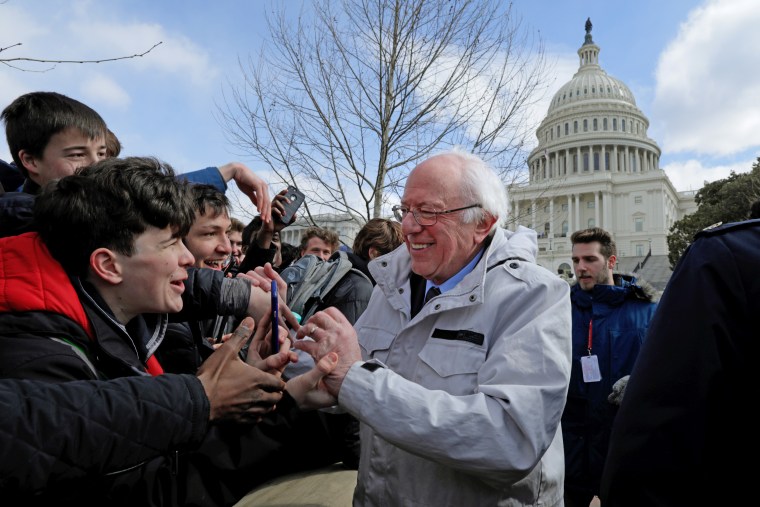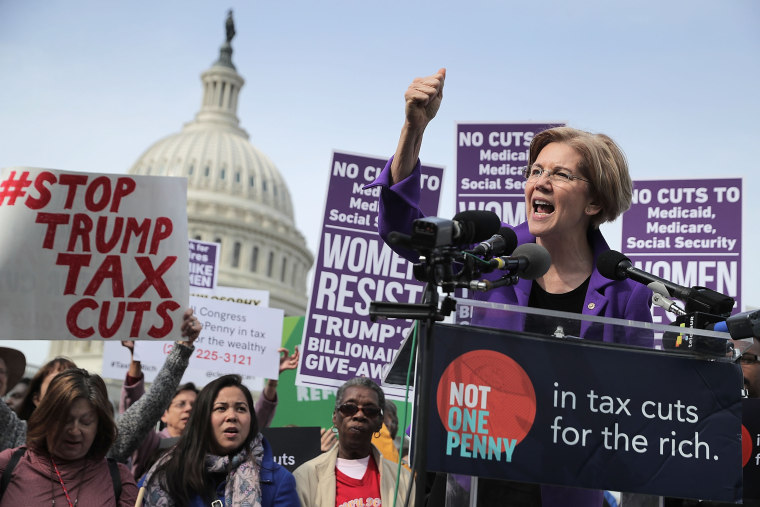WASHINGTON — Senate Democrats have served as their party's most important bulwark against the agendas of President Donald Trump and the GOP congressional majority for over a year now. But beneath the solidarity they have displayed are growing tensions being fueled by considerations of two very different electoral tracks — this year's midterm elections and the 2020 presidential race.
As nearly a dozen Senate Democrats face difficult re-election races in diverse states, others are shoring up the party's progressive base, potentially with eyes on jumping into the next presidential sweepstakes.
While such political concerns aren't new to the Senate, aides and observers say that the tactics now being used by some of the presidential aspirants have crossed a line by attacking fellow Democrats for political gain. Progressive defenders, meanwhile, say senators should be held accountable when they veer from the populist message.
In at least three instances over the past 14 months, potential 2020 presidential candidates Sens. Elizabeth Warren, D-Mass., and Bernie Sanders, I-Vt., have singled out fellow Senate colleagues who didn’t support them on policy by naming them in either fundraising pleas or providing fodder to liberal activist groups for their organizing emails.
And some Democrats are concerned such tactics are jeopardizing the re-election of some of their most vulnerable senators this fall.
“To run in red states is a high wire act and requires perfect candidates and perfect campaigns even in the best of years,” said a Democratic aide who was granted anonymity to speak more freely. “For anyone to come along and seek to gain politically in any way by attacking on questionable policy grounds is wrong.”
Senate Democrats have an uphill battle in November if they hope to regain a majority, or even hold onto their current seats. Eleven Democrats from states Trump won are running for re-election this year and Democrats privately acknowledge that many of those races will not be easy.
Those facing the biggest challenge hail from more rural states with more conservative electorates such as Montana, Missouri, North Dakota, Indiana and West Virginia.
The divisions have resulted in predictable policy disagreements, but what has some Democrats concerned are the tactics being used. Instead of attacking Republicans, they are attacking each other.
The flare ups come as Democrats are struggling to find a message that resonates with voters beyond being just anti-Trump and as the party is struggling to come to terms with the notion of party purity.
Republicans are noticing and see an opening. Alexandra Smith, executive director of America Rising PAC said the potential presidential candidates have shown “the gloves are already coming off to prove their liberal credentials.”
“The Democratic Party faces an ever-expanding field of potential 2020 candidates intent on causing headaches for red-state Senate Democrats as they spend this cycle testing out their progressive messages,” Smith said. “(Senate Democratic Leader) Chuck Schumer must be thrilled.”
The most recent flare-up was during consideration of a banking bill to loosen some regulations imposed on all banks in the aftermath of the financial crisis. The measure was aimed at relieving community and regional banks from some reporting requirements. Sen. Warren had been aggressively fighting the legislation and she blamed its eventual passage on the 16 Democrats who voted for it.
Warren sent out a fundraising email, obtained by NBC News, that said, “we want everyone to know whose side their senators are standing on this week.” It listed senators under two categories: “Senators who helped roll back the rules on the biggest banks” and “Senators who voted with working people against the ‘BankLobbyistAct.’”
“When I saw a handful of my Democratic colleagues vote for it, it felt like a stab in the heart — not for me, but for all the homeowners who were cheated and the taxpayers who bailed out those banks,” Warren told the Congressional Progressive Caucus conference.
Senators who supported the bill thought the attacks were unjustified and misleading. They said Warren misrepresented what the bill does and greatly exaggerated its impacts.
“Well, I think some of the criticism was just flat wrong, and some of it was unfair. But you’re talking to somebody who’s not afraid to say I'm a moderate,” Sen. Claire McCaskill, D-Mo., told MSNBC.
Aides grumbled and senators took their complaints to Schumer, who confronted Warren during a weekly leadership meeting in his office, according to multiple sources familiar with the exchange. Warren defended herself, telling Schumer and the other members present that it was an issue she has dedicated her career to fighting and that they weren’t paying attention if they didn’t know she’d fight the regulatory rollback, those sources said.
Critics say that calling out Democrats by name, however, goes too far.
“Everybody can have disagreements about policy but to make it personal takes it to a new level,” one Democratic aide who works for a member up for re-election said.
Some worry about the reverberations of Warren’s attacks. She has a massive progressive following that has been building since the 2008 financial crisis largely because of her willingness to fight Wall Street.
“This is super freaking real,” a Democratic strategist who used to work in the Senate said of the tensions in the party. “(Sen.) Tester is pissed at Warren over what happened on banking.”
Sen. Jon Tester, D-Mont., is running for re-election in a state Trump won by more than 20 points. He has a Republican challenger and after the banking fight, a Green Party candidate entered the race, challenging him from the left.
Tester, however, downplayed any anger or friction within the party.
“Things happen through the process. One day your enemy in the next day is going to be your friend,” he told NBC News.
While the banking bill was the most recent, it isn’t the only policy battle that has pitted moderate midterm Democrats with the presidential liberals.

Democrats are angry because they believe that a staffer for Sen. Sanders worked with some activist groups to criticize Sen. Jeanne Shaheen, D-N.H., for offering what they said was a watered-down resolution calling for congressional oversight in the U.S. involvement in Yemen’s civil war instead of a stronger Sanders’ measure. Irritated Democrats point to an inflammatory press release by the groups Peace Action, Code Pink and others that called on Shaheen to pull her bill that they said would “keep starving Yemeni children to death.”
Sanders' office denies having any role in the strongly worded release, but sources stand by their assertion, a sign of growing tensions within the caucus. Sanders’ resolution ultimately failed and Shaheen voted for it.
While Shaheen isn’t up for re-election until 2020 in New Hampshire, it was the latest in a series of events that frustrated fellow senators. The Vermont Independent previously angered Democrats last year over the issue of importing drugs from Canada.
Sanders said in an interview at the time that the Democratic Party has to prove they have “the guts” to “stand up to powerful special interests.” And his political organization, Our Revolution, criticized Democrats who voted different than Sanders on the drug issue in a tweet.
And Democrats, who shut down the government in an effort to protect Dreamers — the young immigrants brought to the country by their parents — felt shunned when some of the immigration groups publicly named the eleven Democrats who voted to reopen the government, calling them the “Deportation Caucus.”
While other Democrats with potential presidential aspirations — like Sens. Cory Booker of New Jersey, Kamala Harris of California, Kristen Gillibrand of New York and Minnesota's Amy Klobuchar — have taken positions and votes to shore up their progressive credentials, they haven't directly engaged their colleagues on issues where they disagree.
Sen. Chris Van Hollen, D-Md., who is tasked with helping elect and re-elect Democrats to the senate, sided with the senators with the most immediate concern. He said senators have to listen to their constituents first and foremost and all members must respect that.
“We have a good discussion in our caucus and everyone needs to focus on the goal which is winning in 2018,” he told NBC News.
